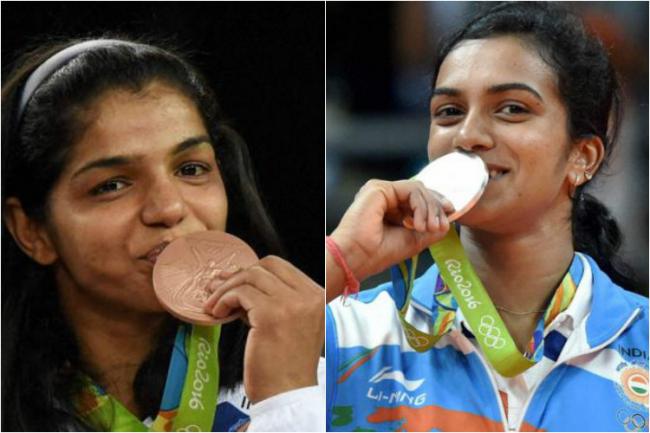India at Rio Olympics: Thin Silver Lining in Largely Dark Clouds

Rio de Janeiro: As the curtains came down on the world’s greatest sports extravaganza here, India goes back with one silver medal and one bronze - consolation prizes for a nation of 1.3 billion people amidst dashed hopes of improving on London Olympics of four years ago, when six medals were won.
In the beginning, top officials of the Indian Olympics Association (IOA) were hopeful that India would reach a double-digit in medals, an assumption which got shattered in the first few days here when athlete after athlete either did not qualify, or came up just short of a medal. It was women power, though, which saved everyone here, and the nation, deep blushes as at one stage it appeared the Indian contingent would go home empty handed.
India goes back with one silver medal and one bronze - consolation prizes for a nation of 1.3 billion people amidst dashed hopes of improving on London Olympics of four years ago, when six medals were won.
Sakshi Malik from Haryana won the bronze medal in women’s wrestling and was given the honour to be the flag-bearer at the closing ceremony. P.V. Sindhu from Hyderabad won a silver in badminton, missing the top honour after a very good fight. Gymnast Dipa Karmakar from Tripura did everyone proud when she reached within touching distance of a bronze, coming fourth in the vault event.

Another heartbreak was Aditi Ashok, who showed a rare patch of brilliance in the first two days of golf, only to end up at 41st position on the fourth, although the 18-year-old Bengaluru golfer was roundly admired and applauded for her determination and play. Lalita Babar from Maharashtra did her career best in 3000m steeplechase, though coming 10th and bettering her national record by three seconds. The men, though, disappointed in almost everything they touched. Gold medallist Shooter Abhinav Bindra saw the bronze slip out of his hand at the last moment in a shoot-out. How is it that India failed to reach even the London tally of six, though it had sent the largest ever contingent of 117 sports persons to Rio? Perhaps Bindra’s coach Heinz Reinkemeier nailed it in his hometruth: “You send athletes from a country which doesn’t have good training facilities, as they have in Europe and China, and you want a gold?”
Perhaps it’s not merely the lack of international training facilities. Sports need consistent support from school to Olympics which is patchy in India, at best. A little bit of ignominy was added to the near medal drought when wrestler Narsingh Yadav was disqualified from Olympics after World Anti-Doping Agency (WADA) went on appeal at the last moment against National Anti-Doping Agency (NADA)‘s clean chit to him. The Court of Arbitration for Sport (CAS) sitting in Rio slapped a four-year ban on Narsingh a day before his scheduled bout, overlooking the “conspiracy angle” in the doping test failure.
Shooter Jitu Rai belied the hopes of several officials for a medal when he ended up eighth in 10m air pistol final after playing brilliantly throughout the qualifying round. He then crashed out of 50m air pistol, perhaps misjudging the wind in the last few shots. Gurmeet Singh showed a bit of spirit in the 25m rapid fire pistol event, but eventually was left behind. Mairaj Ahmad Khan ended ninth in men’s skeet event after missing three shots in the final round in a shoot-out. In the rarefied atmosphere of medal contenders, mistakes are not tolerated. Indian boxers too crashed out of Olympics with Vikas Krishan took a major pound from his Uzbek opponent in the 75kg bout. Shiva Thapa in 56kg and Manoj Kumar in 64kg too left the arena without a medal.
Several Olympic and World records were broken in Rio, raising the bar yet again in several sports. Indian athletes may aspire to reach Olympics height, but they end up falling short. On the last day of the greatest sporting show on Earth, India’s Yogeshwar Dutt lost out tamely to his Mongolian rival in the 65kg freestyle wrestling and the athletics entries came nowhere striking distance of the top finishers. All this means that there would be a lot of soul-searching in India on why Rio was a practical failure for such a highly populated country. Can one hope that Tokyo 2020 be different?
IANS




